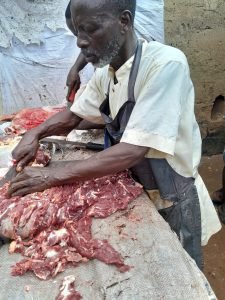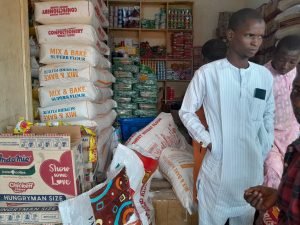Nigeria, once celebrated as the giant of Africa, now grapples with an unsettling reality – a relentless slide into deepening poverty worsened by recent economic decisions by President Bola Ahmed Tinubu. On this occasion of her 63rd independence anniversary, Gom Mirian delves into their multifaceted impact, particularly on poor Nigerians and small businesses
Across the geographical landscape of Nigeria, citizens and enterprises are in a state of chaos. From Abuja to Lagos, Sokoto to Anambra, the tales are the same; a struggle to adjust to biting economic hardship brought on by an abrupt removal of fuel subsidies by President Bola Tinubu on May 29, 2023 and other economic policies.
At 63, Nigerians are worse off than what they were at independence, economically. with manufacturing plans gone comatose and investors packing up due to unfavourable business environment and government policy summersaults that adversely affect their operations. But in all, the the poor Nigerians and small business owners get the hardest hit. For years, the country has been in a struggle to combat poverty, and now with the Tinubu-led administration, the situation has worsened.

In June 2023, barely weeks after Tinubu removed subsidy on petrol, the World Bank, in its Nigeria Economic Update, disclosed that no fewer than four million Nigerians were pushed into the poverty trap in the first six months of 2023, with another 7.1 million more expected to join if properly targeted measures are not taken to manage the impact of fuel subsidy removal.
It noted that high inflation and rising food prices led to more poverty in the country, in addition to ‘severe foreign exchange distortions.’ The World Bank, however, added that “compensating transfers will be essential in helping to shield Nigerian households from the initial price impacts of the petrol subsidy reform.”
Policy Inconsistency: A Barrier to Economic Progress
“The most significant challenge facing Nigeria is poverty, and the only way to address it is to create more jobs and improve social welfare for the people,” says Ibrahim Achi, a Data and Research Manager, at Skills Outside School Foundation. “However, the policy inconsistency of the government is making it difficult to achieve these goals, and poverty is rising.”
This inconsistency is felt throughout the country, as small business owners struggle to keep their enterprises afloat in the face of ever-changing policies. “Every week, there is a new announcement from the government, and we have to adjust our business plans accordingly,” laments Michael, a small business owner in Abuja. “This constant change disrupts our operations, and we end up losing money.”
This loss is felt deeply by the people employed by these businesses, as well as those who depend on them for their daily needs. “My husband used to work in a small business, but it closed down due to the policy changes,” says Fatima, a resident of Lugbe, located in the Federal Capital Territory (FCT) . “Now, we struggle to put food on the table, and our children are suffering.”
Another Abuja resident, Ms. Blessing, runs a cyber cafe in the city’s commercial district. She was seen napping during business time and told Africa Health Report: “Nobody is coming to work. Since this government took office, we have experienced low patronage. The majority of the people who come here are from offices around here, but due to the increase in fuel prices, many of them no longer come. Some will tell you that they only come to work once or twice a week, so we hardly ever get customers some weeks.”

Food Insecurity Worsens as Farmers, Traders Lament
These policies have also affected the agricultural sector, a vital source of income for many Nigerians. “The government recently banned the importation of certain goods, including maize, which is the major component of poultry feeds,” states Mrs Kate Chukwuka, a poultry farmer along Airport Road. “Our yields are declining because we can no longer afford to purchase the more expensive local options.”
At the AMAC market in Abuja, traders stand shoulder to shoulder, offering a myriad of commodities to shoppers. However, in recent months, a cloud of uncertainty and hardship has settled on the market following the pronouncement of fuel subsidy removal by the present administration. The continuous skyrocketing of fuel prices has made the once-thriving businesses of meat butchers and other foodstuff sellers a thing of the past.
“In my 30 years as a meat butcher, I’ve faced numerous challenges, but this fuel price hike hits us right where it hurts,” laments Baba Adamu Hassan, a seasoned meat butcher, with a grim expression. “Transporting livestock from the rural areas has become an expensive affair. Many of us can’t afford the increased transportation costs, and we end up with dwindling supplies and higher prices for our customers.

He continued: “The business is no longer profitable, but I can’t close because otherwise how will my kids eat? A cow we previously brought here for about N350,000 now costs us N480,000 due to the increasing cost of petrol. It is better for us if the government keeps the old fuel price and reinstates the fuel subsidy, he continued,” added Baba Hassan.
Ahmed, a foodstuff vendor expresses deep concern over rising food prices. “The fuel price hike has pushed up transportation costs, and we are no longer able to offer competitive prices. We used to sell at a thinner margin to make a decent profit, but now we barely cover our expenses. Our customers, many of whom are struggling with financial difficulties themselves, are turning to alternatives like gari and beans due to the rising cost of rice,” he stated.
He further said: “Local rice was formerly sold for N28,000 with transportation costs of N32,000, but it is now N40,000 and is sold for N44,000 while foreign rice is now sold for N49,000. The current mudu for local rice is N1400, as against the previous price of N1000.

“Transporting beans used to be relatively affordable, but with increasing fuel prices, beans going for N44,000 now goes for N66,000. It feels like we’re burning our profits just to keep our businesses running. At times, we have no choice but to raise our prices, leaving us in a constant battle between keeping our customers satisfied and trying to stay afloat.”
But amidst the bleakness over many businesses, gari sellers like Mary find solace in the ‘importance’ and affordability of their product. She says “gari is a staple food for many in Nigeria; it’s versatile, affordable and in high demand.
”Despite the challenges, our business has been thriving because we mainly source our cassava locally. While others may suffer due to increased transportation costs, our fuel consumption is minimal, allowing us to maintain steady prices and customer loyalty,” she said.



